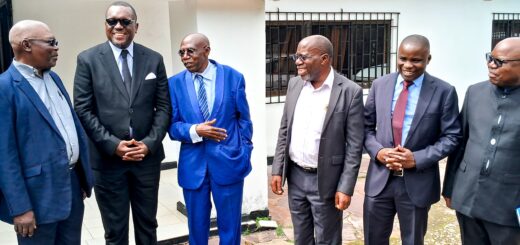Study highlights refugees’ potential to contribute to Zambia’s economy
Notice: Undefined index: catFilterList in /home/zambi/public_html/wp-content/plugins/wp-likes/api.php on line 243
By UNHCR Zambia Public Information Unit +260 979585832
Monday 13 March 2017
A research in Zambia, dubbed ‘Refugee Economies Study’, whose findings have been presented to both the Government of the Republic of Zambia (GRZ) and UNHCR, shows that refugees and former refugees (whose status has ceased) are, in various ways, contributing positively to Zambia’s economy, and have the potential to contribute further to national development if legal and other obstacles are removed.
The study, was conducted by researchers from the Institute of Economic and Social Research (INESOR) of the University of Zambia, in technical partnership with the Refugee Studies Centre, University of Oxford, United Kingdom and lasted for three months from October last year to January 2017. The study targeted refugees (Congolese, Burundians, Somalis some Rwandans and others) and former refugees (Rwandans and Angolans) in urban areas like Lusaka, as well as those living in the two rural settlements: Mayukwayukwa under Kaoma district in Western province and Meheba under Kaulumbila district in North-Western province.
It is the first time in Zambia’s over 50 years of hosting refugees to formally obtain and document “feedback” from refugees and former refugees on their livelihoods, economic interaction and technological activities and, thereby, provide useful information to the Government, UNHCR and other stakeholders in understanding the refugee economies in Zambia.
The study is timely in that it comes at a time when the Government of the Republic of Zambia is working on a new Refugee Bill that is scheduled to be tabled in the National Assembly soon. In this regard, the study findings could help inform the bill – especially on matters that relate to the economic impact of refugees’ livelihood activities on Zambian host communities and how such activities can be enhanced further.
UNHCR Representative in Zambia Ms Laura Lo Castro described the study findings as landmark “The findings will help UNHCR with information as we make livelihoods interventions. Furthermore, it is our hope that the Government of Zambia would consider the findings of this study to inform the future policies on refugees – especially with regard to the various reservations to the 1951 UN Convention,” she said.
Lead researcher, Dr Mushiba Nyamazana, of the University of Zambia who unveiled the study findings underlined the fact that, among other things, the study specifically looked at the refugees and former refugees’ capacity to invest and employ labour, consumption patterns for goods and services, contribution to human capital formation (skills and expertise) and value chains participation patterns at small and medium level enterprises. The study also looked at use and impact of internet and Information communication technology (ICT) and challenges faced by refugees and former refugees in livelihoods activities.
Dr Nyamazana, in his presentation highlighted that the refugees and former refugees in Zambia were doing everything possible, within the available legal and social space, to nurture a livelihood, thus, in their own way, contribute positively to Zambia’s economy.
The study segmented the livelihoods activities of refugees and former refugees by nationality. However, the predominant preoccupations of refugees and former refugees range from farming, running businesses such as trading in shops, artisans, animal husbandry to providing skills and labour services in formal and informal employment. The refugees and former refugees, have in some cases, employed Zambians – especially in urban areas.
The study findings indicate that, with regard to naturalisation, refugees and former refugees, like any other migrants when absorbed in local communities, have the capacity to transfer skills to locals, i.e. as evidenced by the new farming and consumption patterns of growing cassava and rice in the settlement areas, handcrafting of clay roofing tiles that is commonly practiced by the Rwandans and Burundians in Zambia. Furthermore, the business acumen – of starting small and expanding over the years – exhibited by Rwandans and Burundians in the Zambian urban markets and compounds, is something Zambians can learn from.
Thus, refugees, like other migrants can be positive forces for innovation and as change agents-harnessing their diversity and expertise can contribute positively to Zambia‘s economic wellbeing.
Zambia has a robust and enviable history in Africa of hosting refugees, with some first, second and third generation, who have been continuously living in the country for over 50 years since 1966.
However, Dr Nyamazana cited a number of challenges that impede refugees and former refugees to flourish economically and fully participate in Zambia’s economy. Among the challenges cited are:
• Zambia reservations: articles 17 (2) and 26 of 1951 Convention on Status of Refugees, i.e. rights to work and freedom of movement
• 1970 Refugees (Control) Act; subsequent regulations and immigration and deportation act reinforce the reservations.
• 1970 Refugees (Control) Act provides for discretionary powers for Minister to designate areas for refugees to reside but practices suggest mandatory encampment
Other reservations include the fact that refugees are treated like other foreigners – who can only be granted work permits if no qualified Zambian is able to fill a vacancy.
Though the immigration Department has been flexible through administrative measure, and UNHCR is thankful for that, the law stipulates that for a refugee to obtain an investment permit, they require US$250,000 for a new business and US$150,000 to join an existing business, like any other foreigner.
Furthermore, with regard to work permits fees: for first time issue K2,000 is required, while renewal attracts K2,500, with duplicate K2,000 and variation K2,500. In addition, a spouse or child has to part with costs K1,000.
For most refugees, these fees are very exorbitant. Hence, the study recommends some relaxation on freedom of movement and other reservations to unlock the potential of refugees and former refugees.
The study makes a number of recommendations, which hinge on removing several reservations that Zambia has made to the UN 1951 Convention on Refugees.
The study cautions that delayed “legal integration” of former refugees i.e. owing to the reservations could give rise to national productivity and output losses as labour cannot be “saved”.
Ms Lo Castro agreed with Dr Nyamazana’s findings, describing Zambia’s reservations to the 1951 UN Refugee Convention as a big setback that has retarded refugees and former refugees’ enormous potential to contribute positively to Zambia’s economic fabric.
‘As UNHCR, we’ll continue to engage the Government to consider removing these reservations, so that refugees realise their economic potential and become economic drivers,” observed Ms Lo Castro.
Zambia is currently host to 57,200 people of concern (refugees and former refugees), domiciled in the two refugee settlements, urban areas and those who are self-settled in other parts of the country.
UNHCR Zambia
Public Information Unit
+260 979585832
Join our #WithRefugees campaign
Sign the petition today























